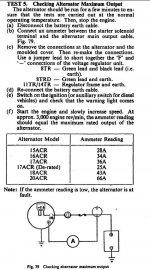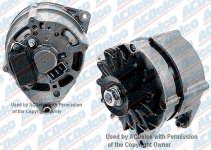I have had my second TR-6 (1967) since 1994 had have had to replace the alternator because of a problem with the bearings. After putting the new one in place, I noticed (for the first time it dawned on me) that there were only two wires on the alternator plug. A heavy brown and a small brown/yellow. There is also a small brown ih the harness, but the female connector is too small to fit on the alternator blade. Should I get a larger female connector for this wire? I have noticed that the alternator warning light does not come on when I start the car, but does when I shut it down.
Frank
Frank

 Hi Guest!
Hi Guest!

 smilie in place of the real @
smilie in place of the real @
 Pretty Please - add it to our Events forum(s) and add to the calendar! >>
Pretty Please - add it to our Events forum(s) and add to the calendar! >> 

